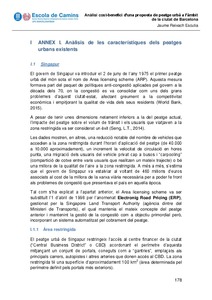Mostra el registre d'ítem simple
Anàlisi cost-benefici d'una proposta de peatge urbà a l'àmbit de la ciutat de Barcelona
| dc.contributor | Garola Crespo, Àlvar |
| dc.contributor.author | Reixach Escutia, Jaume |
| dc.contributor.other | Universitat Politècnica de Catalunya. Departament d'Infraestructura del Transport i del Territori |
| dc.date.accessioned | 2017-12-15T12:13:25Z |
| dc.date.available | 2017-12-15T12:13:25Z |
| dc.date.issued | 2017-06 |
| dc.identifier.uri | http://hdl.handle.net/2117/112154 |
| dc.description.abstract | El creixement progressiu del transport privat observat durant les últimes dues dècades en entorns urbans arreu del món ha propiciat l’aparició de greus problemes (pèrdua de temps de viatge, contaminació ambiental, soroll, etcètera) associats a la congestió de la xarxa urbana. Com a conseqüència, cada cop més administracions públiques municipals han implementat mesures enfocades a reduir el nombre de desplaçaments en transport privat com, per exemple, els peatges urbans. Aquest treball pretén analitzar l’impacte social que suposaria la implementació d’un peatge urbà a l’àmbit de Barcelona, establint futures línies de treball que permetin ampliar els resultats obtinguts en el present treball. Les primeres fases d’aquest treball es centren en analitzar els diferents aspectes dels peatges urbans actuals amb l’objectiu d’entendre com afecten cadascun d’aquests aspectes a l’impacte generat pel propi peatge. Tot seguit s’ha estudiat la mobilitat, xarxa viària i congestió a l’àmbit de Barcelona que, juntament amb les bones pràctiques observades en relació als aspectes dels peatges urbans, han permès la concepció de diverses alternatives d’un model de peatge urbà. Un cop definit el model de peatge urbà d’acord al rendiment i benefici social relacionats amb les diferents alternatives proposades, s’ha estimat l’impacte en mobilitat generat arrel de la implementació del peatge urbà. A continuació, conforme al procediment d’ACB definit, s’han estimat els costs i beneficis social percebuts per la societat arrel de les afectacions derivades del peatge urbà. Finalment, per tal de garantir la validesa dels resultats, s’ha analitzat les incerteses i debilitats del procediment seguit, definint futures línies de treball que permetin corregir aquests defectes ampliant els resultats obtinguts. |
| dc.description.abstract | The progressive growth of urban private vehicle transport observed during the last two decades has led the appearance of significant problems (increase of traveling time, pollution, noise, etcetera) related to the congestion of the urban roads. As a consequence, more and more public municipal administrations have implemented measures focused on reducing the number of users of private vehicles as, for example, congestion charges. This project aims to analyse the social impact associated to the implementation of a congestion charge in the Barcelona area, defining future research lines that will allow extending and improving the results obtained in this project. The first steps of this project focus on analysing the different aspects of existing congestion charges to understand how these aspects affect to the impact generated by the congestion charge. Afterwards, the project studied the mobility, congestion and road network in the area of Barcelona which, altogether with the best practices observed concerning the aspects of existing congestion charges, has enabled the design of several alternative models of a congestion charge. Having defined the model of congestion charge according to the performance and social benefits associated with the different proposed alternatives, the impact on mobility generated by the implementation of the congestion charge has been estimated. Next, according to the defined CBA methodology, the costs and benefits perceived by the society connected to the effects arising from the implementation of the Congestion Charge have been estimated. Finally, to ensure the validity these results, weaknesses and uncertainties of the followed procedure have been analysed, which has allowed defining future research lines in order to correct these defects extending the results. |
| dc.language.iso | cat |
| dc.publisher | Universitat Politècnica de Catalunya |
| dc.rights | Attribution 3.0 Spain |
| dc.rights.uri | http://creativecommons.org/licenses/by/3.0/es/ |
| dc.subject | Àrees temàtiques de la UPC::Enginyeria civil::Infraestructures i modelització dels transports::Transport urbà |
| dc.subject.lcsh | Urban transportation |
| dc.subject.lcsh | Tolls |
| dc.subject.other | Peatge urbà |
| dc.subject.other | Mobilitat urbana |
| dc.subject.other | Emissions del vehicle privat |
| dc.subject.other | Congestió |
| dc.subject.other | ACB |
| dc.title | Anàlisi cost-benefici d'una proposta de peatge urbà a l'àmbit de la ciutat de Barcelona |
| dc.type | Master thesis |
| dc.subject.lemac | Transport urbà |
| dc.subject.lemac | Peatges |
| dc.identifier.slug | PRISMA-118448 |
| dc.rights.access | Open Access |
| dc.date.updated | 2017-07-19T11:02:25Z |
| dc.audience.educationlevel | Màster |
| dc.audience.mediator | Escola Tècnica Superior d'Enginyers de Camins, Canals i Ports de Barcelona |
| dc.contributor.covenantee | Institut Cerdá |



